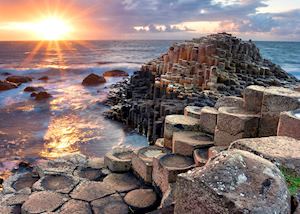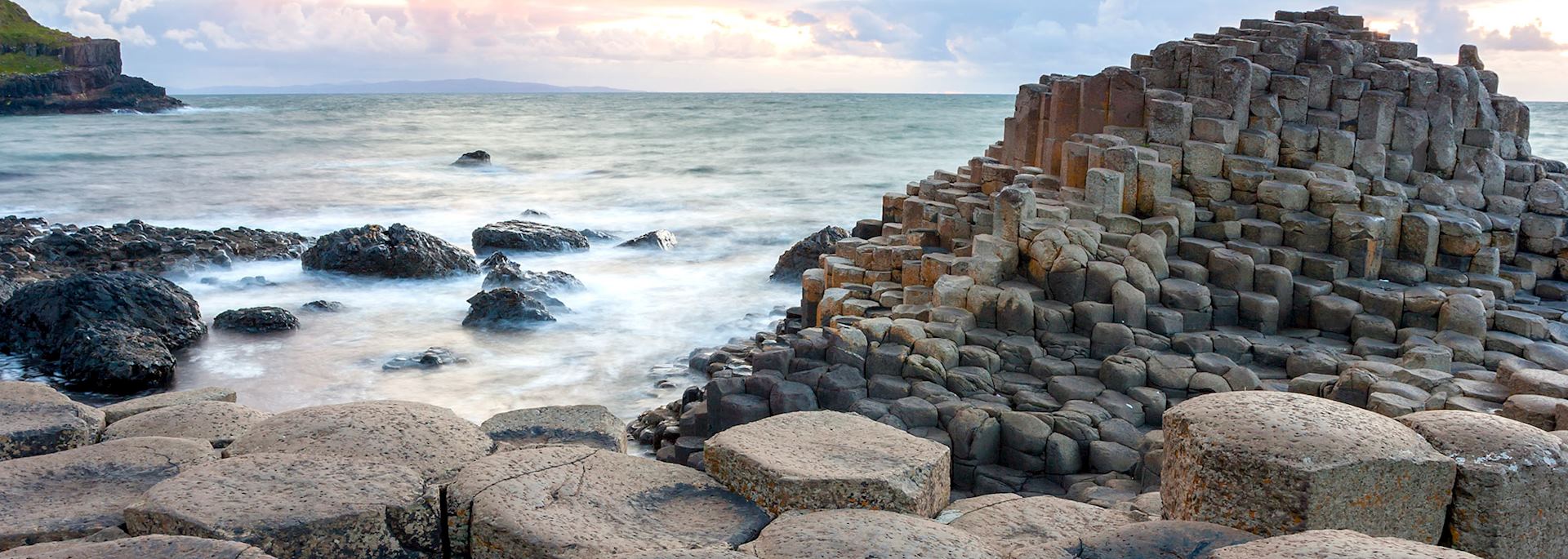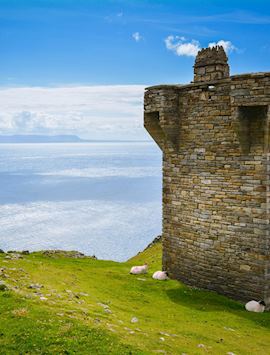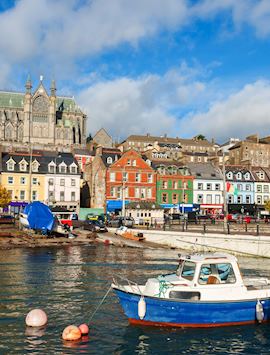Jump to:
Occupying part of a cove on the Antrim Coast, just a half-day’s drive from Belfast, the Giant’s Causeway is an arresting array of 40,000 interlocked stone pillars. Spilling down from a steep cliff into the waters of the North Atlantic, these basalt columns vary in height but are surprisingly regular in shape — they are almost all hexagonal, though on close inspection you can find a few deviations.
Given their eerie uniformity and startling appearance, folklore has accumulated around the striking formation for thousands of years.
 Almost all of the surviving stories feature its namesake: Finn MacCool, a giant Irish hunter and warrior whose adventures form the core of the Irish epic The Fenian Cycle. Also known as Fionn mac Cumhaill, the mythological hero is said to have built the causeway, though different stories give different reasons for the mighty feat.
Almost all of the surviving stories feature its namesake: Finn MacCool, a giant Irish hunter and warrior whose adventures form the core of the Irish epic The Fenian Cycle. Also known as Fionn mac Cumhaill, the mythological hero is said to have built the causeway, though different stories give different reasons for the mighty feat.
Some tales suggest he built the stairs to reach his wife, named Oonagh, while others say he created them to fight a Scottish giant called Benandonner. (A similar columnar formation, created by the same lava field, can be found across the water on the uninhabited island of Staffa, in Scotland's Inner Hebrides. Known as Fingal’s Cave, it’s named after the Scottish version of Finn MacCool.)
For many visitors, the science behind the formation is just as interesting as the mythology. About 60 million years ago, a volcano ejected a field of thick lava from deep beneath the Earth’s mantle. As it cooled rapidly, the lava cracked like a drying mud puddle in the hot sun, creating the characteristically regular columns.
The same eruption also created the formations known as giant’s eyes: large rounded basalt boulders surrounded by rings that have been caused by erosion. There are also several features to look for that have garnered their own names and legends — The Chimney Stacks, Lovers’ Leap and the Giant’s Boot.
Despite their age, many of the polygonal columns retain fairly sharp, geometric edges and you can hop from one to another easily. But those in the surf have been worn by time, tides and waves, making for treacherous footing. Also, some have been slightly hollowed out and hold tiny pools of seawater or host colonies of sea plants.
If you’re a birdwatcher, you may be interested in visiting for more than the geology. The causeway is part of a natural cove, sheltered by high cliffs, and plays home to a wide variety of coastal birds, including fulmars, petrels, shags, cormorants and razorbills, as well as rock pipits and eider ducks.
The causeway falls under the care of the National Trust, as one of the sites of ‘outstanding natural beauty’ it serves to protect. It’s open from dawn to dusk throughout the year. The causeway and the wider coastline also form a UNESCO World Heritage Site, preserved for their ‘global geological importance’. The adjacent Causeway Visitor Centre offers high-tech interactive exhibits about the geology and history of the site.
who's been there

Start planning your tailor-made trip to Giant’s Causeway by contacting one of our Ireland specialists
- 617-223-4757
- Make an inquiry
Suggested itineraries featuring Giant’s Causeway
Our itineraries will give you suggestions for what is possible when you travel in Giant’s Causeway, and they showcase routes we know work particularly well. Treat them as inspiration, because your trip will be created uniquely by one of our specialists.
Places near Giant’s Causeway
- Derry/Londonderry 58 kilometers away
- Northern Ireland 58 kilometers away
- Belfast 81 kilometers away
- County Donegal 122 kilometers away
- Enniskillen 124 kilometers away
- Sligo 166 kilometers away
- Newgrange and the Boyne Valley 173 kilometers away
- Dublin 212 kilometers away
- Galway 275 kilometers away
- Connemara 290 kilometers away
- Kilkenny 292 kilometers away
- The Burren 297 kilometers away
- Inis MĂłr 313 kilometers away
- Limerick 319 kilometers away
- County Wexford 324 kilometers away
- Waterford 335 kilometers away
- Cork 395 kilometers away
- Cobh 396 kilometers away
- Killarney 406 kilometers away
- Kinsale 416 kilometers away
- Dingle Peninsula 425 kilometers away
- Kenmare 426 kilometers away
Ideas for experiencing Giant’s Causeway
Our specialists seek out authentic ways to get to know the places that could feature in your trip. These activities reflect some of the experiences they've most enjoyed while visiting Giant’s Causeway, and which use the best local guides.
-
Giant's Causeway & the Antrim Coast ![Giant's Causeway]()
Giant's Causeway & the Antrim Coast
Giant's Causeway & the Antrim Coast
Discover the Giant's Causeway, medieval castles, rocky islets, film locations and deserted beaches on this full-day private tour from Belfast, which explores the beautiful Antrim Coast and reveals some of its complex history, age-old legends and best scenery.
View details



